Mostrar el registro sencillo del ítem
A user-centric privacy framework for pervasive environments
| dc.creator | Alcalde Bagüés, Susana | es_ES |
| dc.creator | Zeidler, Andreas | es_ES |
| dc.creator | Fernández Valdivielso, Carlos | es_ES |
| dc.creator | Matías Maestro, Ignacio | es_ES |
| dc.date.accessioned | 2023-09-08T09:55:43Z | |
| dc.date.available | 2023-09-08T09:55:43Z | |
| dc.date.issued | 2006 | |
| dc.identifier.citation | Alcalde Bagüés,S., Zeidler, A., Fernandez-Valdivielso, C., Matias, I. R. (2006) A user-centric privacy framework for pervasive environments. En Meersman, R., Tari, Z., Herrero P. (Eds.), On the Move to Meaningful Internet Systems 2006: OTM 2006 Workshops: OTM Confederated International Workshops and Posters, AWeSOMe, CAMS, COMINF, IS, KSinBIT, MIOS-CIAO, MONET, OnToContent, ORM, PerSys, OTM Academy Doctoral Consortium, RDDS, SWWS, and SeBGIS 2006: proceedings. Part II (pp. 1347-1356). Springer. https://doi.org/10.1007/11915072_38. | en |
| dc.identifier.isbn | 978-3-540-48273-4 | |
| dc.identifier.uri | https://hdl.handle.net/2454/46286 | |
| dc.description.abstract | One inherent feature of pervasive computing environments is the need to gather and process context information about real persons. Unfortunately, this unavoidably affects persons¿ privacy to a large degree. Each time today a citizen uses his cellular phone, his credit card or surf the web, he is leaving a trace that is stored for some reason. In a pervasive sensing environment, however, the amount of information collected is a) much larger than today and b) might be used to reconstruct personal information with great accuracy. The question we address in this paper is to control dissemination and flow of personal data across organizational, as well as personal boundaries, i.e., to potential addressees of privacy relevant information. This paper presents the User-Centric Privacy Framework (UCPF). It aims at protecting a user¿s privacy based on the enforcement of privacy preferences. They are expressed as a set of constraints over some set of context information. To achieve the goal of cross-boundary control, we introduce two novel abstractions, namely Transformations and Foreign Constraints, in order to extend the possibilities of a user to describe his privacy protection criteria beyond the current expressiveness ussually found today. Transformations are understood as any process that the user may define over a specific piece of context. This is a main building block for obfuscating or even plainly lie about the context in question. Foreign Constraints are an important complementing extension because they allow for modeling conditions defined on external users that are not the tracked individual, but may influence disclosure of personal data to third parties. We are confident that these two easy-to-use abstractions together with the general privacy framework presented in this paper constitute a strong contribution to the protection of the personal privacy in pervasive computing environments. | en |
| dc.format.mimetype | application/pdf | en |
| dc.language.iso | eng | en |
| dc.publisher | Springer | en |
| dc.relation.ispartof | Meersman, R., Tari, Z.; Herrero, P. (Eds.). On the Move to Meaningful Internet Systems 2006: OTM 2006 Workshops: OTM Confederated International Workshops and Posters, AWeSOMe, CAMS, COMINF, IS, KSinBIT, MIOS-CIAO, MONET, OnToContent, ORM, PerSys, OTM Academy Doctoral Consortium, RDDS, SWWS, and SeBGIS 2006: proceedings. Part II. Berlín: Springer; 2006. p.1347-1356 978-3-540-48273-4 | en |
| dc.rights | © 2006 Springer-Verlag Berlin Heidelberg | en |
| dc.subject | Transformations | en |
| dc.subject | Foreign constraints | en |
| dc.subject | Personal data | en |
| dc.subject | Privacy protection | en |
| dc.title | A user-centric privacy framework for pervasive environments | en |
| dc.type | Contribución a congreso / Biltzarrerako ekarpena | es |
| dc.type | info:eu-repo/semantics/conferenceObject | en |
| dc.date.updated | 2023-09-08T09:42:21Z | |
| dc.contributor.department | Ingeniería Eléctrica y Electrónica | es_ES |
| dc.contributor.department | Ingeniaritza Elektrikoa eta Elektronikoa | eu |
| dc.rights.accessRights | Acceso abierto / Sarbide irekia | es |
| dc.rights.accessRights | info:eu-repo/semantics/openAccess | en |
| dc.identifier.doi | 10.1007/11915072_38 | |
| dc.relation.publisherversion | https://doi.org/10.1007/11915072_38 | |
| dc.type.version | Versión aceptada / Onetsi den bertsioa | es |
| dc.type.version | info:eu-repo/semantics/acceptedVersion | en |


